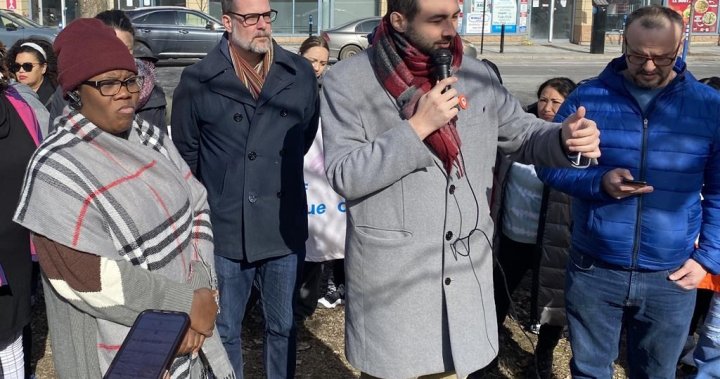Community groups in Montreal are calling for the cancellation of a deportation order for a family from Nigeria who entered Canada as asylum-seekers in 2017. Deborah Adegboye, her husband, and their first child fled religious persecution in Nigeria and now work as an orderly, providing assistance to patients with disabilities. Quebec’s member of the national assembly, Guillaume Cliche-Rivard, expressed disbelief that Canada would deport an essential worker during a health care labor shortage. Adegboye sees the deportation order as a potential death sentence for her family, which includes two children born in Canada, and is pleading for the order to be reversed.
The community groups gathered outside the federal immigration minister’s office in Montreal to demand a halt to the planned deportation, arguing that Adegboye’s family should be allowed to stay in Canada. Adegboye, who has built a life in Canada and cares for her patients as an orderly, fears for the safety and well-being of her family if they are forced to return to Nigeria. The support for the family’s plea to remain in Canada highlights the humanitarian concerns at play in cases of deportation orders impacting individuals who have established their lives in a new country.
Adegboye’s story sheds light on the challenges faced by asylum-seekers who flee their home countries in search of safety and stability. The family’s situation is complicated by the fact that their children were born in Canada, raising questions about their legal status and the impact of deportation on their future. The demonstration outside the immigration minister’s office underscores the growing concern over deportation policies and their impact on vulnerable individuals and families seeking refuge and a better life in Canada.
The presence of Quebec’s member of the national assembly at the demonstration adds political weight to the community’s call to stop the deportation and allow the family to remain in Canada. Cliche-Rivard’s statement about the contradiction of deporting an essential worker during a health care labor shortage highlights the broader implications of immigration policies on critical sectors of the economy. The focus on Adegboye’s role as a healthcare worker emphasizes the valuable contributions that immigrants make to Canadian society and the potential consequences of losing skilled and essential workers due to deportation orders.
As the community groups and supporters continue to advocate for Adegboye’s family to remain in Canada, the case raises broader questions about the fairness and humanity of immigration policies and deportation decisions. The family’s plea for compassion and understanding in the face of potential separation highlights the personal and emotional toll of deportation on individuals and families who have sought refuge and built their lives in Canada. The outcome of this case will have implications for future immigration decisions and the treatment of asylum-seekers and refugees in the country, underscoring the need for a more compassionate and thoughtful approach to immigration enforcement.


